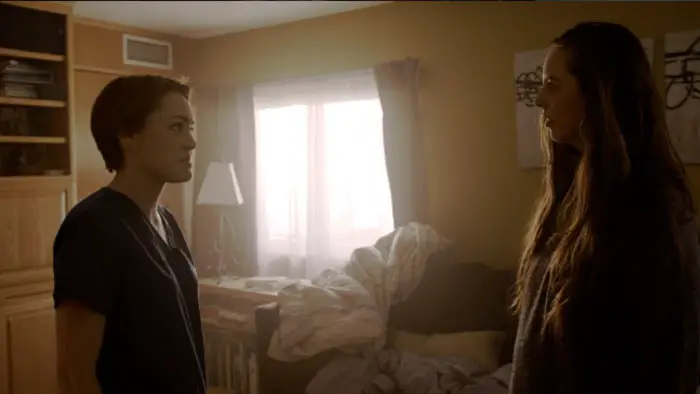
While some films depict mental illness accurately and purposefully (A Beautiful Mind and the more recent Paper Spiders come to mind), most movies fail to do so on account of perpetuating stereotypes and distorted depictions of living with the disorder. Yet, in reality, so many people live with a mental illness that sometimes goes undiagnosed. This is what co-writer/director Marty Lang explores in his exceptionally poignant indie drama Stay with Me.
When we first meet her, Katie (Lara Fox), a personal assistant living with an undiagnosed mental disorder, is in a downward spiral. She’s running frantically from a house and looking back in regret. “You can’t show people you love them when your mind won’t let you,” she says. Katie then begins spilling her guts about everything she said to her friends and later regretted while concomitantly regretting everything she didn’t tell them. These moments are seen via flashbacks as if viewers have entered Katie’s mind momentarily, only to discover that she ends up taking her own life.
Stay with Me then cuts to the present, as Katie’s friend Maya (Addison Turner) is grieving over her death. She soon calls Gavin (James Mitchell Neal), Katie’s ex-boyfriend, to join her at Katie’s place to sort through her belongings. In doing so, they look back on their relationship with her. Maya and Gavin remember Katie being spontaneous, needy, erratic, yet genuinely loving.
Flashbacks are once again used to show how Katie and Gavin’s relationship evolved and deteriorated over time because of her volatile behavior. Even Katie and Maya’s friendship witnessed a decline. Through insight and caution, Lang and co-writer Leaf Maiman don’t oversimplify or overcomplicate Katie’s mental health crisis. They give Katie many dimensions and allow Maya and Gavin time to grieve in their own way.

“…Katie and Gavin’s relationship evolved and deteriorated over time because of her volatile behavior.”
There is a lot to like about this understated drama, particularly how the characters are written and how their responses to tragedy are temptingly complex and sincere. Lang and Maiman avoid placing the blame on any one of them. It is not on Katie that she’s treatment-resistant, and it is not on Gavin or Maya that they grew tired and unsure of how to help their friend. With a steady pace and a melancholic tone, Stay with Me makes good use of three evidently flawed yet sympathetic characters in a realistic, lived-in setting.
Fox’s commitment to the role of the spirited and irascible Katie ensures that every one of her fevered and offhand reactions comes off as genuine. Turner and Neal are just as committed and expressive. They guarantee that a later development in their relationship doesn’t feel entirely tacked on, although it is one of the more cursory plot developments.
Katie and Gavin’s relationship is smartly-written, giving way to several thorny scenes that involve Katie clinging to Gavin for attention. Of course, he wanted to be there for her, but there is only so much one can do when the person they love is unable to manage their unpredictable behavior effectively.
Wisely, cinematographer Natalia Moscoso plays with color to cut between the past and present. In the past, there’s more vivid color. In the present, misty blue and grey hues evoke the somber atmosphere that now permeates Katie’s home. While the visual look is contained, the jumps between the past and present are less so, resulting in some incohesion.
Tackling grief, loss, and regret, Stay with Me is a profoundly intimate and compelling drama that doesn’t have easy answers when helping somebody with an undiagnosed mental disorder. But one can find comfort knowing that when somebody you love passes away, they are always with you in your memory and heart.
For screening information, visit the Stay with Me official website.

"…a profoundly intimate and compelling drama..."


